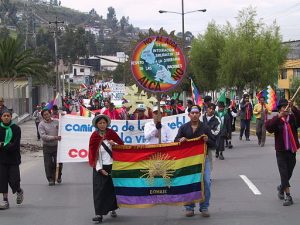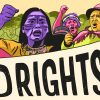Kichwa woman Monica Chuji, an Indigenous leader and political activist has observed the effects of climate change in her community for decades. “In the past few years, it has become a lot hotter,” she reflects in a somber tone. “The large rivers, the watering holes, they are disappearing. We know this from our oral traditions, and because we see the consequences of climate change every day.” However, true to her experience in political mobilization, Monica believes in the power of the collective to mitigate the effects of climate change. “The most important thing in this fight [against climate change’ is to dialogue with everyone, without discrimination and without violence in all of its forms. . . this will permit us to reaffirm an articulation of climate justice.”
Monica’s work as a land defender has its roots in the violence experienced by the Kichwa community of Sarayacu of Sucumbillos in the north of the Ecuadorian Amazon. The ancestral lands of the community have been a target of the Ecuadorian state since the 1970s due to the discovery of oil there. Monica was a witness to her community’s defense against the state and corporate interests, which sought to exploit Kichwa lands for profit.
Feelings of responsibility and leadership run in Monica’s blood. Her father was the founder of her community and her brothers were local and regional leaders. She understood early the importance of maintaining unity and staying organized to defend Indigenous life and land.
After some years, as the Indigenous movement became more well established, they began to mobilize on a national level. The 1990s were an important decade in that process, and during that time, Monica participated in many marches and campaigns. The Indigenous movement interrupted the traditional political life of Ecuador. “The political class was surprised,” Monica says, “in particular that the proposals were coming from the Amazon, talking about territoriality, the protection of Mother Earth. . . we were creating a new political architecture, and fighting for the creation of a plurinational state.”
As part of these political processes, Monica Chuji was creating her own leadership. Thanks to the support of the Church and other organizations, including her university, she became aware of how Western knowledge is often imposed on Indigenous knowledge. The academy was another territory of dispute. Shortly thereafter, she entered the National Confederation of Indigenous Peoples of Ecuador (CONAIE). The organization brought together the Indigenous movement, and assumed responsibilities in international relations.

Members of CONAIE march against the Free Trade Summit in 2002. The organization, which represents Indigenous Peoples from Ecuador in international affairs, was a foundational experience for Monica Chuji as she became involved in political activism.
Her trajectory was elevated when she was named as the Minister of Communication of Ecuador under a new mandate by former president Rafael Correa. However, the new relationship between the political Left and the Indigenous movement broke down quickly, accelerated in part by the Correa government’s repression of Indigenous activists in the Amazon and extractivist sympathies.
Yet Monica’s motivation to defend Indigenous Peoples and territory remained undeterred. In 2008 she was elected as a member of the Constitutional Assembly of Ecuador. Remembering her time as an assembly member, Monica says it was “one of the most difficult times of my life, but also, one of the most important times.” It “affirmed [her] belief that all of public policy has the responsibility to think about how to preserve, conserve, and protect biodiversity and the earth.” The knowledge and the rights of Indigenous Peoples, Chuji belies, are fundamental to this work because “we care for the territory, use resources sustainably, and yet, we are the first ones to feel the impacts of climate change.” Impacts which, Chuji notes, are largely caused by rich nations, not Indigenous Peoples. Monica believes it is necessary to create structural political reforms and maintain a united front to protect Indigenous rights to water, land, and free and informed consultation.
Since leaving politics, Monica has been vice president of the Confederation of Indigenous Nations of the Ecuadorian Amazon and currently works as the vice director of Indigenous Peoples Rights International. She also continues to participate in community initiatives against domestic violence and to promote health. All of this work, Monica says, is connected to the “theme of discrimination” which constitutes the primary barrier to access for Indigenous women in their political respresentation.
Looking towards the future, Chuji believes that urgent action is needed to protect Indigenous communities from climate change.
“The situation of the nine Amazonian nations is very concerning, it is deteriorating and is not gradual, and it is accelerating.” She continues, saying “Indigenous communities experience firsthand the impacts of climate change, and we ask, what do we do? For what? Why do we have to make these decisions?” She points out the injustice at the heart of the climate crisis. “Although we are the ones fighting to conserve the earth, we are the first ones to experience the consequences of climate change.”
To combat feelings of impotence, Chuji appeals to solidarity and recommends the creation of consultation spaces at the COP Conference in which states, civil society organizations, and Indigenous communities can gather.
At COP27, Monica hopes to reach across differences of identity, language, affiliation, and nationality to create alliances in our common fight against climate change. “It is urgently necessary to create solidarity,” she says. “This should be our objective at the COP, to converse with other people and all communities and establish the connections we need to unite and prepare for the climate challenges which await us.”


